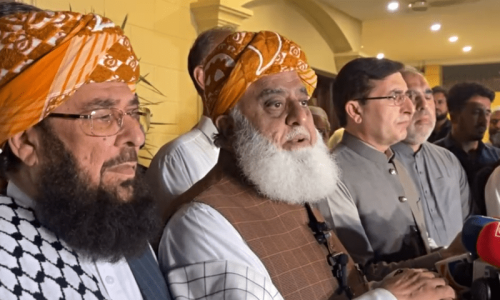PARIS, June 17: President Nicolas Sarkozy on Tuesday launched a major overhaul of the French military, cutting back the armed forces, beefing up intelligence and setting a course for France’s return to Nato command.
A leaner, more mobile and high-tech military will allow France to confront new threats, in particular terrorism which poses the greatest danger, Sarkozy said in an address to some 3,000 officers in Paris.
Bringing France closer to the United States on defence, Sarkozy confirmed that France will soon return to Nato’s integrated command, which it left in 1966 when Charles de Gaulle rejected US dominance of the alliance.
“Today, the most immediate threat is that of a terrorist attack,” said the president in a defining speech as commander-in-chief.
“The threat is there, it is real and we know that it can tomorrow take on a new form, even more serious, with nuclear, chemical and biological means,” he said.
To face up to the threat, Sarkozy announced a “massive investment effort in intelligence” to make use of satellites, drones and other airborne surveillance equipment.
The investments will be offset by cuts in the armed forces, with the army, navy and air forces to be downsized to 225,000 troops, from their current level of some 270,000.
Sarkozy stressed that France would remain “an independent ally” and keep its nuclear deterrent forces under strict national control when it re-joins Nato command, which officials have said is expected to take place in 2009.
“We can renew our relations with Nato without fearing for our independence and without the risk of being unwillingly dragged into a war,” said Sarkozy.
While France is a member of the 26-member alliance, it is not part of the integrated command structure even though it participates in political decision-making bodies.
Rejoining the military command is seen mostly as a symbolic gesture that would entail the appointment of several French generals to Nato military headquarters and to the alliance’s defence planning committee.
But opposition leftists have criticized the move, saying it confirms a shift toward a pro-US stance under Sarkozy’s leadership and a loss of independence that has been a hallmark of French foreign policy for decades.
France will spend a total of 377 billion euros (583 billion dollars) from 2009 to 2020 on defence, including 200 billion euros on new equipment, said Sarkozy. As of 2012, the military budget would increase, he said.
The new security doctrine followed the release on Monday of the first review in 14 years of the French military in a white paper drafted by a blue-ribbon panel of 35 experts.
With the largest army in the European Union, France for the first time made homeland security part of its defence strategy to confront threats from terrorism, cyber-attacks and natural disasters. In his address, Sarkozy pledged to pursue his drive to build a European defence despite Ireland’s rejection of a key EU reform treaty as France takes over the EU presidency in July.—AFP















































Dear visitor, the comments section is undergoing an overhaul and will return soon.